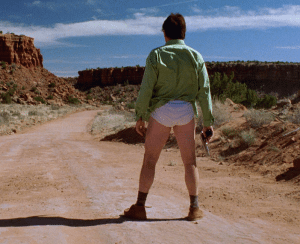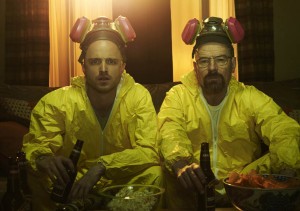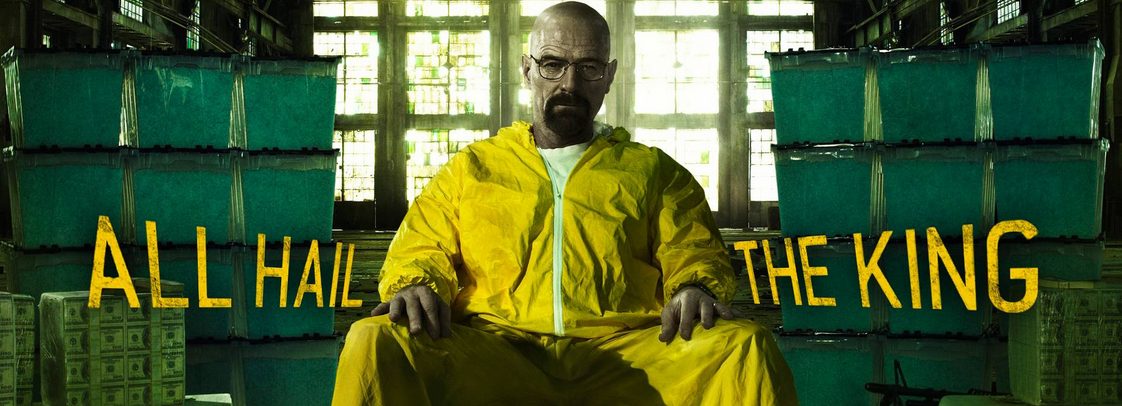Breaking Bad: All Hail The King
***WARNING! Do not read this article unless you have seen all existing episodes of Breaking Bad, up to and including last year’s mid-season finale ‘Gliding Over All’. If you are fully up-to-speed, read on. If not, you are strongly urged to catch up with the series before reading ahead. Spoilers abound!***
I’m one of those irritating individuals who will inevitably try to break the ice at social gatherings with the following question: “So, do you watch Breaking Bad?” And every time, I feel like I should immediately apologise to everyone present for indulging in such repetitive, groan-inducing conduct.
After all, fanboying over Breaking Bad has become so stigmatised that even the writers of Family Guy have started to take the piss out of it. And yes, I can imagine that hearing that phrase over and over again can become quite exasperating. But to be honest, when all is said and done, apologising for gushing over any kind of cultural phenomenon is actually quite foolish. Surely, if something comes along which so effortlessly piques one’s enthusiasm, wouldn’t it be a disservice to bottle up such excitement without sharing it with the world? And when it comes to Breaking Bad, it’s only fair to honour such a victorious series by singing the praises of the team behind its production.
 The brainchild of creator Vince Gilligan, Breaking Bad began in 2008 with a simple premise, and one which has long remained at the root of the series, even as its storylines and themes have branched out in various directions. The original pitch focused on one man’s transformation “from Mr. Chips to Scarface”, and after 54 episodes of gradual intensification, the metamorphosis is almost complete. Finally, before embarking on the last leg of Walter White’s corrupt, corrosive journey, it’s worth looking back at the series in its entirety, to take stock of how it has developed across the past five-and-a-half years.
The brainchild of creator Vince Gilligan, Breaking Bad began in 2008 with a simple premise, and one which has long remained at the root of the series, even as its storylines and themes have branched out in various directions. The original pitch focused on one man’s transformation “from Mr. Chips to Scarface”, and after 54 episodes of gradual intensification, the metamorphosis is almost complete. Finally, before embarking on the last leg of Walter White’s corrupt, corrosive journey, it’s worth looking back at the series in its entirety, to take stock of how it has developed across the past five-and-a-half years.
There are too many strengths inherent to Breaking Bad to concisely squeeze into one article, but if I had to ascertain the show’s primary asset, it would be its team of writers, and the two most striking qualities thereof: the writers’ power to shock, and their keen sense of restraint. These seemingly contradictory qualities have both dovetailed beautifully across the show’s entire span, producing a viewing experience which rarely fails to be anything less than completely gripping. By refraining from igniting the emotional and visceral intensity at every turn, the writers of Breaking Bad have kept proceedings well-measured and deliberate, to the point that when even the tiniest revelations do arrive, their impacts are paramount.
Consider for a moment: half the time, what are we really getting worked up about? Compare the scale of its thrills to, say, those of a Hollywood blockbuster. The kicks provided by this series are just as electrifying, yet they do not equate – in scale, at least – to the walloping force of seeing entire cities levelled on the big screen. And yet, in Breaking Bad’s second season, something as simple as watching a woman light up a cigarette is able to incite similar gasps of surprise and horror in its viewers. Reaching such a point where even the most humdrum of activities take on their own disturbing significance is a testament to the deft forward-thinking that fuels this series. Indeed, with its precise, calculated writing and a sly emphasis on symbolism, Breaking Bad has always been a slow-burner. Rather than galloping from one climax to another, each layer and component is slowly and steadily stacked atop the last, painstakingly broadening the series’ scope, while also tightening the tension to almost-unbearable levels. And then, everything will align for a heightened moment of devastation, which is seldom dealt with in a predictable fashion, regardless of any clues offered beforehand.
 And when they do finally arrive, how incredible are those payoffs? Looking through the entire series, there are enough individual moments of transcendence to fill countless highlight reels. For instance, how heartbreaking is the cold open of ‘Buyout’, wherein Walter, Mike and Todd disassemble a dirt bike in grave silence, each of them attempting to forget the next task waiting for them? And then there’s the episode ‘Down’, in which Jesse, homeless, penniless and soaked in blue goop, collapses on the floor of his RV in a fit of exhausted tears. And, of course, the truly horrific sight of Walter, lying on his back in the crawl space, choking on his own hideous, hysterical laughter as his entire world crumbles all around him…
And when they do finally arrive, how incredible are those payoffs? Looking through the entire series, there are enough individual moments of transcendence to fill countless highlight reels. For instance, how heartbreaking is the cold open of ‘Buyout’, wherein Walter, Mike and Todd disassemble a dirt bike in grave silence, each of them attempting to forget the next task waiting for them? And then there’s the episode ‘Down’, in which Jesse, homeless, penniless and soaked in blue goop, collapses on the floor of his RV in a fit of exhausted tears. And, of course, the truly horrific sight of Walter, lying on his back in the crawl space, choking on his own hideous, hysterical laughter as his entire world crumbles all around him…
Right across the board, from the early capers of Season 1 to the methodical darkness of Seasons 4 and 5, audiences have been treated to a tableau of set-pieces and character arcs which have proved to be as rich as each other. And at last, everything is now arranged in a position where we care deeply about the fates of every player left in the game. Just think of Hank, presumably still sat there on the toilet, with his hands shaking as they clutch that final, fatal clue to Heisenberg’s true identity. Who would’ve thought that the big-mouthed lout from Season 1 would grow into the role of the series’ cherished hero? Or that the confrontational faux-gangsta-isms of Jesse Pinkman would dissolve to reveal a frightened kid, way out of his depth and striving for redemption?
And then there’s Walter himself: the man at the centre of it all. His continuing descent into darkness has manifested itself in countless moments, but most interestingly of all, consider the notion that his adversaries had become less antagonistic as the series progressed. Beginning with the straightforwardly psychopathic Tuco, Walter was damn right in his assertion that the man was “an insane, degenerate piece of filth”, and yes, he arguably deserved what he got. A little further along, Walter and Jesse were pitted against Tuco’s ruthless, faceless cousins, and next, the chilling Gustavo Fring, before Walter finally moved in to dispose of the burly Mike Ehrmantraut. But who was Mike, really? As his speech implied moments before his (painfully unjust) death, he was just a guy who wanted to do his job. Mike may have done bad things in his line of work, but he was certainly no villain. Rather, this was a man content to just get on with it, so that he could devote more time to solving his crossword puzzle and playing with his beloved granddaughter. Yet, of course, Walt, the sonuvabitch, had to “blow it up”.
 Why? Because he has become the true villain of the series, soon to be pitted against the show’s shining beacon of integrity: Hank Schrader. Walter’s moral compass has cracked so dramatically that there is no longer any way for him to justify the measures he has taken, emblematised in his pointless, impulsive murder of Mike. His entreaties for “no more bloodshed” in Season 1 were cruelly mocked by his orchestration of Season 5’s callous prison massacre. The tables have turned, and even now, as Walter finally attempts to restore normalcy to his lifestyle, the damage has already been done, and the ripple effects of his actions will no doubt return to haunt him.
Why? Because he has become the true villain of the series, soon to be pitted against the show’s shining beacon of integrity: Hank Schrader. Walter’s moral compass has cracked so dramatically that there is no longer any way for him to justify the measures he has taken, emblematised in his pointless, impulsive murder of Mike. His entreaties for “no more bloodshed” in Season 1 were cruelly mocked by his orchestration of Season 5’s callous prison massacre. The tables have turned, and even now, as Walter finally attempts to restore normalcy to his lifestyle, the damage has already been done, and the ripple effects of his actions will no doubt return to haunt him.
What can we expect, then? Bryan Cranston has described the final trail of episodes as “a rollercoaster ride to hell”, and Gilligan has made claims that the chosen conclusion brought tears to his eyes. Other than that, the only clues we can infer are from the titles of the forthcoming episodes, the cryptic teasers available for viewing online (if we Brits can find a way to access them – thanks for that, AMC), and prevailing interpretations of Percy Bysshe Shelley’s magnificent poem, ‘Ozymandias’. Only one thing is certain regarding the action itself: Walt will live to see his 52nd birthday. How long he has beyond that, however, is anyone’s guess.
It would be ludicrous to even try and claim that the world we live in is anywhere near perfect, but in terms of culture, this truly is a golden era. How fortunate we are to be present during the reign of television shows such as Breaking Bad, and how blessed we can consider ourselves to be watching – and waiting – as its final eight episodes unravel. In the latest teaser trailer, Walter gravely intones that key line from Shelley’s aforementioned poem: “‘Look on my works, ye Mighty, and despair!’” Although Mr. White’s empire may be lost to the sands of the Albuquerque desert, you can be sure that this is one television series which will leave a lasting legacy in its wake.

Comments